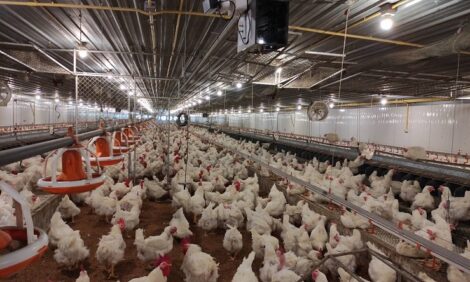



Call for Arsenic to be Banned in Poultry Feed
US - It's time to ban arsenic in poultry feed, according to this report.It's no secret that poultry dominates the agriculture industry on Maryland's Eastern Shore, reports Delmarva Now. But few people know that our increasingly industrialised poultry system routinely uses arsenic, a common rat poison, as part of a chicken's diet.
Unnecessary for production, arsenic is finding its way into the chicken we eat, polluting our environment in the process. It's time Maryland legislators put a stop to it.
Maryland's chicken industry has changed dramatically over the last 50 years. Today, nearly 300 million broiler chickens are grown and sold from more than 800 Maryland farms. Up to a couple of hundred thousand chickens can live in these large facilities in cramped conditions that provide little sunlight.
Because diseases can spread quickly in these settings, arsenic is commonly used to treat intestinal illnesses.
Between 1995 and 2000, 70 per cent of the 8.7 billion chickens produced each year in the US were fed arsenic. According to the Institute for Agriculture and Trade Policy, 55 per cent of chickens in grocery stores and 100 per cent of chicken served in fast-food restaurants carried detectable traces of arsenic.
Chronic exposure to arsenic is linked to increased risk for bladder, kidney, lung, liver and colon cancers, as well as heart disease, diabetes and neurological problems in children. Moreover, chicken litter spread on local crop fields can also contain arsenic. Potential excess runoff from these fields can introduce the poison into waterways like the Chesapeake Bay. Groundwater tests throughout Maryland's coastal plains have found arsenic concentrations reaching up to 13 times the EPA's tolerance limit.
Yet chickens can be raised without arsenic. Vaccines and probiotics are under development to treat intestinal disease in chickens. Some companies in Maryland have already eliminated the poison.
Delmarva Now reports that, unfortunately, many in the poultry industry continue to defend the effectiveness and safety of arsenicals. Just last year, a bill intended to ban the use of arsenic met resistance from the industry. While the Food & Drug Administration, US Department of Agriculture and the Environmental Protection Agency share responsibility for monitoring and regulating toxic contaminants like arsenic, the system is weak and fragmented, leaving consumers and the environment unprotected.
The legislators in the General Assembly can be leaders on this important issue. It should not be left to individual companies to decide if they want to use arsenic or to consumers to wonder whether their poultry is tainted with this chemical. It's time to ban the use of arsenic in chicken feed in Maryland and eliminate all doubt for consumers that the chicken they eat is safe, nutritious and not a threat to the environment, concludes the Delmarva Now article.








